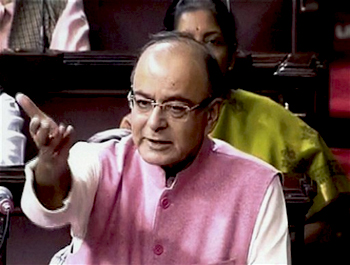New Delhi, Mar 10: Congress today accused the BJP- led government of "criminal consipracy" in allowing businessman Vijay Mallya, facing probe in several loan default cases, to fly out of the country, as Finance Minister Arun Jaitley sought to corner the main opposition party by saying the loans were given to him during UPA rule.

Raising the matter during Zero Hour, Azad said everyone knew Mallya "could flee any day" and the investigating agencies should have seized his passport and taken steps to restrict his movement.
Maintaining that Mallya lived a "luxurious life" and had bases in several countries, the Congress leader said Mallya is not a "needle" and moves around with an entourage and expressed surprise how he managed to leave the country despite a CBI "Look Out Notice".
"My allegation is that this government is party to this criminal conspiracy of allowing him to escape and leave the country. In this criminal conspiracy, this Government should be made party and the Supreme Court should take note of this.
"Without the participation and without the active support of this government, he could not have left the country. That is my allegation," Azad said, adding that "one had escaped, the second Lalit Modi (Mallya) should not be allowed to escape".
Countering the charges, Jaitley said the banks have been asked to recover "every penny that is due", adding that the first banking facility was given to Mallya and his companies in September 2004 which were renewed in February 2008.
The Leader of the House further said the accounts were declared non-performing assets (NPA) on April 30, 2009 and these debts were restructured and more facilites extened in December 2010.
"In what circumstances were the loans given is an issue of investigation and the CBI is investigating," he said.
"How these accounts were running, what facilities were given, the dates tell their own story," Jaitley said, adding "when the loans were given, how they were given... introspection will be required."
Jaitley said the liabilities including interest aggregates to Rs 9,091.4 crore as on November 30, 2015.
Maintaining that banks and financial institutions were taking steps to recover dues and attachment of properties, the Minister said he had a list of 22 cases filed in different parts of the country and added that some assets have also been attached.
He also said there was no order to stop Mallya from leaving the country.
"That day, there was no order of any agency to stop him (from leaving the country)," Jaitley said, adding Mallya had left the country before the banks moved the Supreme Court for seizure of his passport.
Mallya had left the country on March 2.
On Azad's contention that the present government had failed to bring back Lalit Modi, Jaitley said it was during the UPA rule that the former IPL chief had left the country.
"I was giving an example that one had escaped, the second Lalit Modi (Mallya) should not be allowed to escape," Azad said.
The senior Congress leader also said that during his long political career, he has never recommended to any bank for advancing loan to any person.
Earlier, Naresh Agrawal (SP) said the matter of Mallya, a Rajya Sabha MP, should be referred to Ethics Committee.
Deputy Chairman P J Kurien said: "I agree with you. This is a matter to be taken up by the Ethics Committee".






Comments
Are you aware there are dozens of online jobs the place you
possibly can work and earn good monthly revenue!
My blog :: SalesEnvy Bonus: http://salesenvy.pen.io/
Mallya should be treated as terrorist, because he cheated many innocent employees by holding their salaries and he is reason for the suicide of his many employees.
Indian government should make arrangements to bring him back from other country without any delay.
In each bank there is a thief, the thief might have been informed him to leave the country in advance.
Add new comment